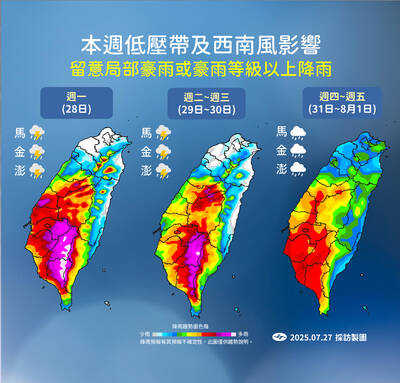Chinese Minister of Culture Cai Wu (蔡武) yesterday called for a greater liberalization in cross-strait cultural exchanges, but said China would not “yield benefits” in a cultural agreement as it did in signing a trade pact in June.
Cai, who is scheduled to return to China today after a seven-day visit, said both sides could cooperate to create better conditions for cultural exchanges.
“They include simplifying procedures, lowering thresholds and gradually lifting restrictions,” Cai said. “People on both sides of the Taiwan Strait will be the true beneficiary of cross-strait exchanges and peaceful development.”
THRESHOLDS?
When asked whether the thresholds he mentioned referred to relaxing regulations on market access to China’s culture and creative industries, Cai did not give a definite answer, but said both sides could talk about how to create a win-win scenario.
“There are WTO rules in place and each side has its own policies for managing its domestic market,” he said during a visit to the National Museum of History in response to a media query.
“We can talk about how to connect the two and make things easier and more convenient,” he said.
While Beijing promoted with great fanfare the “benefits” the Economic Cooperation Framework Agreement (ECFA) would bring to Taiwan before the pact was signed in June, Cai said cultural exchanges were different.
“Cultural exchanges have always been two-way and mutually beneficial,” he said.
As for Council for Cultural Affairs Minister Emile Sheng’s (盛治仁) proposal to establish official cultural affairs offices on both sides of the Taiwan Strait, Cai said the idea was being discussed, but there was no timetable.
SEF VIEWPOINT
Straits Exchange Foundation (SEF) Chairman Chiang Pin-kung (江丙坤), who hosted Cai at a lunch at the Ambassador Hotel yesterday, said cross-strait negotiations have entered a new phase since the ECFA was signed.
“Our policy is to tackle the easier issues and economic issues precede political ones,” Chiang said. “Now we are still dealing with the economic issues, but we can begin to tackle the more difficult ones.”
Describing Cai’s visit as a “milestone,” Chiang said before the two sides took the next step — political negotiations — there were other issues that needed to be addressed, including culture, education, media and sanitation.
Chiang said that he and Association for Relations Across the Taiwan Strait Chairman Chen Yunlin (陳雲林) had agreed to discuss sanitation at their next meeting later this year.
Chiang said he hoped both sides would continue to shelve their differences and seek common ground.

The Central Weather Administration (CWA) today issued a "tsunami watch" alert after a magnitude 8.7 earthquake struck off the Kamchatka Peninsula in northeastern Russia earlier in the morning. The quake struck off the east coast of the Kamchatka Peninsula at 7:25am (Taiwan time) at a depth of about 19km, the CWA said, citing figures from the Pacific Tsunami Warning Center. The CWA's Seismological Center said preliminary assessments indicate that a tsunami could reach Taiwan's coastal areas by 1:18pm today. The CWA urged residents along the coast to stay alert and take necessary precautions as waves as high as 1m could hit the southeastern

The National Museum of Taiwan Literature is next month to hold an exhibition in Osaka, Japan, showcasing the rich and unique history of Taiwanese folklore and literature. The exhibition, which is to run from Aug. 10 to Aug. 20 at the city’s Central Public Hall, is part of the “We Taiwan” at Expo 2025 series, highlighting Taiwan’s cultural ties with the international community, National Museum of Taiwan Literature director Chen Ying-fang (陳瑩芳) said. Folklore and literature, among Taiwan’s richest cultural heritages, naturally deserve a central place in the global dialogue, Chen said. Taiwan’s folklore would be immediately apparent at the entrance of the

Speeding and badly maintained roads were the main causes of a school bus accident on a rainy day in Taipei last year that severely injured two people and left 22 with minor injuries, the Taiwan Transportation and Safety Board said. On March 11 last year, a Kang Chiao International School bus overturned inside the Wenshan Tunnel (文山隧道) on the northbound lane of the Xinyi Expressway. The tour bus, owned by Long Lai Co, exceeded the speed limit after entering the tunnel, the board’s investigation found. Sensing that the rear of the vehicle was swaying, the driver attempted to use the service and exhaust

Central and southern Taiwan are to see increasingly heavy rainfall from last night through Friday due to the effects of a low-pressure system and southwesterly winds, the Central Weather Administration (CWA) said. CWA forecaster Liu Pei-teng (劉沛滕) said Tropical Storm Co-May had weakened into a low-pressure system on Saturday, but that it strengthened again into a tropical depression (TD 11) near the seas around Japan's Ryukyu Islands due to favorable environmental conditions. The tropical depression is expected to persist for two to three days, moving west-northwest by this afternoon and reaching China's Zhejiang through the East China Sea tomorrow,